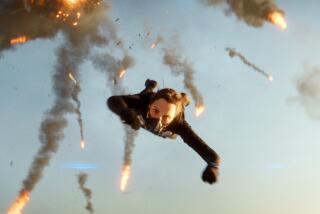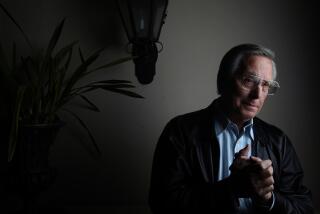Friedkin Restores His ‘Connection’
- Share via
Director William Friedkin has embraced the DVD format and was extensively involved in the digital editions of his 1973 classic, “The Exorcist,” and his most recent movie, “Rules of Engagement.”
“I love it,” Friedkin says of the format. “I think it’s the best way to see a film--with good equipment, of course. You see it free of all distractions. I don’t want to see all of those scratches on the screen and dirt.”
For the 30th anniversary edition of his 1971 “The French Connection” ($27 for DVD; $10 for VHS), Friedkin spent several months restoring the film frame by frame. “Then I remixed the whole soundtrack, because the original was monaural. I redid a lot of the sound effects so that it would be more of a contemporary experience for people who love DVD.”
“The French Connection” won five Academy Awards: best film, best director, best actor (Gene Hackman), best editing (Jerry Greenberg) and best adapted screenplay (Ernest Tidyman).
Based on the book by Robin Moore, “The French Connection” deals with the real-life exploits of Harlem narcotics squad officers Eddie Egan and Sonny Grasso and their investigation into a French heroin smuggling operation in 1962.
Hackman played Egan, called Jimmy “Popeye” Doyle in the film; Roy Scheider was Grasso, renamed Buddy “Cloudy” Russo.
Both Egan and Grasso have roles in the movie.
The two-disc DVD features a new documentary, “Making the Connection: Untold Stories of the French Connection”; a BBC documentary, “Poughkeepsie Shuffle”; several deleted scenes hosted by Friedkin; the trailer; a stills gallery; talent files; a fact-filled commentary track with Friedkin, and another with Hackman and Scheider.
The videocassette version includes seven deleted scenes.
Friedkin, a former documentary filmmaker, had just finished “Boys in the Band” when he was approached by producer Phil D’Antoni, who had purchased the rights to Moore’s book.
“We spent the better part of two years trying to get this story along,” Friedkin recalls. “Every studio in town had passed on it. Most of them passed on it twice. We had two different scripts that didn’t work before a third script caused [Fox studio head] Dick Zanuck to greenlight the film just before he was fired at Fox.”
Zanuck gave them a mere $1.5 million to make “The French Connection.”
Friedkin remembers Zanuck telling him: “If you guys can make the film for that, go ahead. But I won’t be here when you finish it.”
“He was right,” Friedkin says. “He was fired about a week before we started shooting. It was a miracle we ever got to complete the film. The studio was in chaos at the time.”
It was Zanuck who talked Friedkin out of trying to get Paul Newman to play Doyle.
“He said, ‘Don’t try to get stars. You’ll never get Paul Newman. He costs too much money. Just go out and cast it with the best possible actors.”’
“The French Connection” was filmed in 40 days during one of the coldest winters on record in New York City. Shot in a documentary style, the production used real locations, no sets.
“‘The French Connection’ was actually an independent film,” the director says. “Aside from the fact it was financed by 20th Century Fox, we had no contact with the studio.”
One person who never visited the location was screenwriter Tidyman, says Friedkin, who adds that most of the dialogue was improvised.
Before production began, Friedkin went on patrol and drug busts with Egan and Grasso. And he had Hackman and Scheider do the same.
“Hackman and Scheider would come back with stuff they had heard Eddie and Sonny say,” Friedkin says. “Ernest Tidyman, may he rest in piece, never spent any time with Eddie or Sonny. The film was created on the set. That is the truth of it.”
The famous chase sequence in which Doyle pursues the L train wasn’t in the script either.
“I felt it needed it,” says Friedkin. “The producer and I, a week or so before we started shooting the film, decided to walk from my apartment toward the Battery. It was 55 blocks. All around us we heard the rumble of the train and the subway beneath our feet. That gave us this idea. Then I had to go find out if it was possible for a car ever to catch a train.”
*
Also new this week is the DVD of Franc Roddam’s 1979 youth epic “Quadrophenia” (Rhino, $25). Produced by the Who and set to their music, this energetic film chronicles the early ‘60s British youth groups the Mods and the Rockers. Phil Daniels and Sting star.
The DVD includes a wide-screen transfer of the newly restored film, plus a clever Mod or Rocker quiz, a trailer of classic Vespa scooter commercials, a Who discography, a talent file, photo gallery, trailers, a film trivia subtitle track, a short interview with a very self-effacing Sting and insightful commentary with director Roddam, who made his feature directorial debut with this film.
Rhino is also releasing the restored “Quadrophenia” on video ($15).
*
Don’t have a cow, man! Everyone’s favorite dysfunctional family has finally arrived on DVD. Fox’s three-disc “The Simpsons--The Complete First Season” ($40) is a ride back to the early years of the long-running, Emmy Award-winning series.
The discs include all 13 episodes of the first season, plus scripts of four of the shows, several foreign-language clips, early sketches for the series, and an appearance of “The Simpsons” when they were used as bumpers on “The Tracey Ullman Show.”
Also included are a BBC documentary featuring “Simpsons” creator Matt Groening, very funny commentaries on each episode with Groening and various producers, writers and directors, outtakes from an episode with Albert Brooks and an unaired version (and for good reason) of the “Some Enchanted Evening” episode.
*
With the third installment of CBS’ “Survivor” series just around the corner, Paramount Home Video has released the VHS ($15) and DVD ($20) of “Survivor, Season Two: The Australian Outback--The Greatest & Most Outrageous Moments.” Basically a two-hour-plus highlight reel, it includes scenes that didn’t make it past the censors, a look at every single tribal council and each contestant’s audition and interview tapes.
*
New from Xenon is “Welcome to Death Row” ($20 for both VHS and DVD), a compelling documentary that chronicles the rise and fall of rap’s Death Row Records founder Suge Knight, who recently was released from a federal penitentiary in Oregon.
Though the filmmakers weren’t given permission to use the songs of such Death Row artists such as Dr. Dre, Tupac Shakur and Snoop Dogg, there are extensive interviews with rappers and behind-the-scenes talent, as well as numerous film clips.
The DVD includes commentary from director S. Leigh Savidge, interview outtakes and biographies.
More to Read
Only good movies
Get the Indie Focus newsletter, Mark Olsen's weekly guide to the world of cinema.
You may occasionally receive promotional content from the Los Angeles Times.







